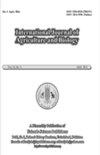{"title":"旱作条件下农家肥与石膏配施可提高花生产量和品质","authors":"Rizwan Latif","doi":"10.17957/ijab/15.1828","DOIUrl":null,"url":null,"abstract":"Peanut (Arachis hypogaea L.) is the common cash crop of the rainfed areas. Appropriate management practices are very important to get better yield of peanut in sandy loam soil. A field study was carried out during the growing seasons of 2018 and 2019 to evaluate the effect of poultry manure (PM) (37.1 t ha-1), farmyard manure (FYM) (49.4 t ha-1), gypsum (GYP) (2.5 t ha-1), liquid humic acid (HA) (49.4 L ha-1) and co-application of GYP (1.2 t ha-1) and FYM (24.7 t ha-1) on peanut yield, quality and soil physical properties. Application of FYM, PM, HA and GYP (alone or in combination) significantly improved peanut yield, quality and soil physical properties. The combined application of GYP and FYM proved most effective (P ≤ 0.05) in improving the peanut yield (no. of pods per plant, 100 seed weight etc), quality (crude protein and oil content) and soil physical properties (moisture percentage, infiltration rate and bulk density). The combined application of GYP and FYM increased the pods yield by 67 and 65% during 2018 and 2019, respectively than control. Crude proteins (21%) and oil contents (9.0%) were also substantially increased in the combined application. Moreover, the combined application of GYP and FYM significantly retained the soil moisture and reduced bulk density of soil. Present findings suggest that integrated use of FYM and GYP under field conditions could improve the crop productivity, crude protein, oil contents, moisture percentage, and reduce the bulk density of soil thus improving overall soil health. © 2021 Friends Science Publishers","PeriodicalId":13769,"journal":{"name":"International Journal of Agriculture and Biology","volume":null,"pages":null},"PeriodicalIF":0.0000,"publicationDate":"2021-08-01","publicationTypes":"Journal Article","fieldsOfStudy":null,"isOpenAccess":false,"openAccessPdf":"","citationCount":"3","resultStr":"{\"title\":\"Co-Application of Farmyard Manure and Gypsum Improves Yield and Quality of Peanut (Arachis hypogaea) under Rainfed Conditions\",\"authors\":\"Rizwan Latif\",\"doi\":\"10.17957/ijab/15.1828\",\"DOIUrl\":null,\"url\":null,\"abstract\":\"Peanut (Arachis hypogaea L.) is the common cash crop of the rainfed areas. Appropriate management practices are very important to get better yield of peanut in sandy loam soil. A field study was carried out during the growing seasons of 2018 and 2019 to evaluate the effect of poultry manure (PM) (37.1 t ha-1), farmyard manure (FYM) (49.4 t ha-1), gypsum (GYP) (2.5 t ha-1), liquid humic acid (HA) (49.4 L ha-1) and co-application of GYP (1.2 t ha-1) and FYM (24.7 t ha-1) on peanut yield, quality and soil physical properties. Application of FYM, PM, HA and GYP (alone or in combination) significantly improved peanut yield, quality and soil physical properties. The combined application of GYP and FYM proved most effective (P ≤ 0.05) in improving the peanut yield (no. of pods per plant, 100 seed weight etc), quality (crude protein and oil content) and soil physical properties (moisture percentage, infiltration rate and bulk density). The combined application of GYP and FYM increased the pods yield by 67 and 65% during 2018 and 2019, respectively than control. Crude proteins (21%) and oil contents (9.0%) were also substantially increased in the combined application. Moreover, the combined application of GYP and FYM significantly retained the soil moisture and reduced bulk density of soil. Present findings suggest that integrated use of FYM and GYP under field conditions could improve the crop productivity, crude protein, oil contents, moisture percentage, and reduce the bulk density of soil thus improving overall soil health. © 2021 Friends Science Publishers\",\"PeriodicalId\":13769,\"journal\":{\"name\":\"International Journal of Agriculture and Biology\",\"volume\":null,\"pages\":null},\"PeriodicalIF\":0.0000,\"publicationDate\":\"2021-08-01\",\"publicationTypes\":\"Journal Article\",\"fieldsOfStudy\":null,\"isOpenAccess\":false,\"openAccessPdf\":\"\",\"citationCount\":\"3\",\"resultStr\":null,\"platform\":\"Semanticscholar\",\"paperid\":null,\"PeriodicalName\":\"International Journal of Agriculture and Biology\",\"FirstCategoryId\":\"1085\",\"ListUrlMain\":\"https://doi.org/10.17957/ijab/15.1828\",\"RegionNum\":0,\"RegionCategory\":null,\"ArticlePicture\":[],\"TitleCN\":null,\"AbstractTextCN\":null,\"PMCID\":null,\"EPubDate\":\"\",\"PubModel\":\"\",\"JCR\":\"Q2\",\"JCRName\":\"Agricultural and Biological Sciences\",\"Score\":null,\"Total\":0}","platform":"Semanticscholar","paperid":null,"PeriodicalName":"International Journal of Agriculture and Biology","FirstCategoryId":"1085","ListUrlMain":"https://doi.org/10.17957/ijab/15.1828","RegionNum":0,"RegionCategory":null,"ArticlePicture":[],"TitleCN":null,"AbstractTextCN":null,"PMCID":null,"EPubDate":"","PubModel":"","JCR":"Q2","JCRName":"Agricultural and Biological Sciences","Score":null,"Total":0}
引用次数: 3
Co-Application of Farmyard Manure and Gypsum Improves Yield and Quality of Peanut (Arachis hypogaea) under Rainfed Conditions
Peanut (Arachis hypogaea L.) is the common cash crop of the rainfed areas. Appropriate management practices are very important to get better yield of peanut in sandy loam soil. A field study was carried out during the growing seasons of 2018 and 2019 to evaluate the effect of poultry manure (PM) (37.1 t ha-1), farmyard manure (FYM) (49.4 t ha-1), gypsum (GYP) (2.5 t ha-1), liquid humic acid (HA) (49.4 L ha-1) and co-application of GYP (1.2 t ha-1) and FYM (24.7 t ha-1) on peanut yield, quality and soil physical properties. Application of FYM, PM, HA and GYP (alone or in combination) significantly improved peanut yield, quality and soil physical properties. The combined application of GYP and FYM proved most effective (P ≤ 0.05) in improving the peanut yield (no. of pods per plant, 100 seed weight etc), quality (crude protein and oil content) and soil physical properties (moisture percentage, infiltration rate and bulk density). The combined application of GYP and FYM increased the pods yield by 67 and 65% during 2018 and 2019, respectively than control. Crude proteins (21%) and oil contents (9.0%) were also substantially increased in the combined application. Moreover, the combined application of GYP and FYM significantly retained the soil moisture and reduced bulk density of soil. Present findings suggest that integrated use of FYM and GYP under field conditions could improve the crop productivity, crude protein, oil contents, moisture percentage, and reduce the bulk density of soil thus improving overall soil health. © 2021 Friends Science Publishers


